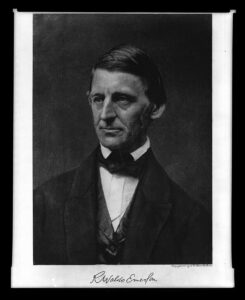
Photo-mechanical print of Ralph Waldo Emerson, Transcendentalism leader
Transcendentalism was an early 19th-century philosophical and theological school of thought that merged the ideals of Unitarianism and German Romanticism, prized self-sufficiency, and upheld the inherent goodness of humanity and nature.
Origins of Transcendentalism
Transcendentalism loosely began in Massachusetts in the early 1800s, emerging from dissatisfaction with Unitarianism’s emphasis on reason. New beliefs centered on personal insight and emotional spiritualism looked to the values of German Romanticism and philosopher Immanuel Kant, leading to a split.
In the 1830s, more cohesive literature would organize these shifting beliefs into the movement known as Transcendentalism.
Transcendental Club
In September of 1836, Frederic Henry Hodge, Ralph Waldo Emerson, and Unitarian ministers George Ripley and George Putnam met to discuss their ideas on Unitarianism. It was called the “Transcendental Club” and would meet 30 more times over the next four years. The Transcendentalist philosophy created in these meetings would be published in Emerson’s essay “Nature.”
Beliefs
Transcendentalism focused mainly on the power of the individual—their ability to know God personally, their innate goodness, and the power of insight and self-sufficiency. It also focused on idealism and respect for nature and objected to materialism, perhaps most clearly embodied by the work of follower and writer Henry David Thoreau.
A tendency toward nonconformity meant Transcendentalists were leaders in many major reform movements such as free religion, improved education, better working conditions, abolition, and women’s suffrage.
Key Figures in Transcendentalism
Along with Thoreau, Emerson, Hodge, Ripley, and Putnam, Transcendentalism attracted such figures as Margaret Fuller, Orestes Brownson, Elizabeth Palmer Peabody, James Freeman Clarke, Bronson Alcott, W.E. Channing, and W.H. Channing.
In 1841, George Ripley used Transcendentalist ideals to create a utopian commune called Brook Farm, where author Nathaniel Hawthorne would spend some time. It was short-lived, fading out by 1847.
The decline of Brook Farm, followed closely by the death of major Transcendentalist figure Margaret Fuller in 1850, brought an end to organized Transcendentalism.
Learn more about Transcendentalism through historical newspapers from our archives. Explore newspaper articles, headlines, images, and other primary sources below.
Articles and Clippings about Transcendentalism
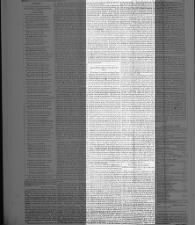 Opinion piece discusses problems of German theology, Kant, Goethe, and other literary leaders, 1838 Sat, Nov 10, 1838 – Page 4 · The Biblical Recorder (Raleigh, North Carolina) · Newspapers.com
Opinion piece discusses problems of German theology, Kant, Goethe, and other literary leaders, 1838 Sat, Nov 10, 1838 – Page 4 · The Biblical Recorder (Raleigh, North Carolina) · Newspapers.com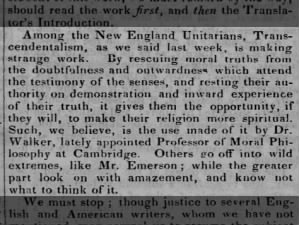 Speculative opinion on the purpose of Transcendentalism in 1838 paper and its use by Emerson Wed, Dec 26, 1838 – 1 · Vermont Chronicle (Bellows Falls, Vermont) · Newspapers.com
Speculative opinion on the purpose of Transcendentalism in 1838 paper and its use by Emerson Wed, Dec 26, 1838 – 1 · Vermont Chronicle (Bellows Falls, Vermont) · Newspapers.com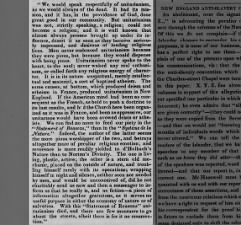 Boston Quarterly editorial opinion on Unitarianism (as shared in Boston Post 1841) Thu, Jun 24, 1841 – Page 2 · Boston Post (Boston, Massachusetts) · Newspapers.com
Boston Quarterly editorial opinion on Unitarianism (as shared in Boston Post 1841) Thu, Jun 24, 1841 – Page 2 · Boston Post (Boston, Massachusetts) · Newspapers.com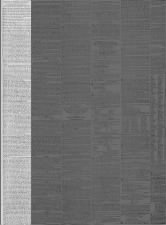 Excerpt of correspondence describing George Ripley and wife and their association at Brook Farm Wed, Apr 9, 1845 – Page 1 · New-York Tribune (New York, New York) · Newspapers.com
Excerpt of correspondence describing George Ripley and wife and their association at Brook Farm Wed, Apr 9, 1845 – Page 1 · New-York Tribune (New York, New York) · Newspapers.com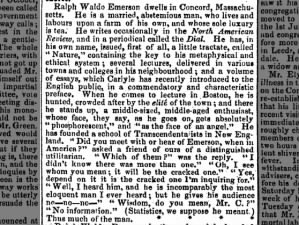 Excerpt from a sketch of Ralph Waldo Emerson, 1847, mentions his essay "Nature" Tue, Oct 19, 1847 – 3 · Liverpool Mercury, etc. (Liverpool, Merseyside, England) · Newspapers.com
Excerpt from a sketch of Ralph Waldo Emerson, 1847, mentions his essay "Nature" Tue, Oct 19, 1847 – 3 · Liverpool Mercury, etc. (Liverpool, Merseyside, England) · Newspapers.com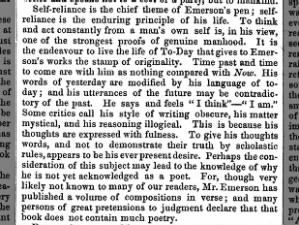 Excerpt from 1848 article describes Emerson's "chief theme" of self-reliance Sat, Jan 8, 1848 – 6 · Sheffield and Rotherham Independent (Sheffield, South Yorkshire, England) · Newspapers.com
Excerpt from 1848 article describes Emerson's "chief theme" of self-reliance Sat, Jan 8, 1848 – 6 · Sheffield and Rotherham Independent (Sheffield, South Yorkshire, England) · Newspapers.com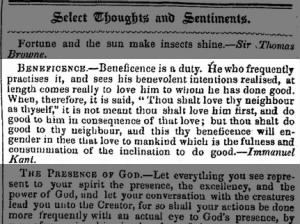 A sample of the sentiments of Prussian German philosopher Immanuel Kant as shared in an 1848 paper Sat, Sep 30, 1848 – 12 · Manchester Weekly Times and Examiner (Manchester, Greater Manchester, England) · Newspapers.com
A sample of the sentiments of Prussian German philosopher Immanuel Kant as shared in an 1848 paper Sat, Sep 30, 1848 – 12 · Manchester Weekly Times and Examiner (Manchester, Greater Manchester, England) · Newspapers.com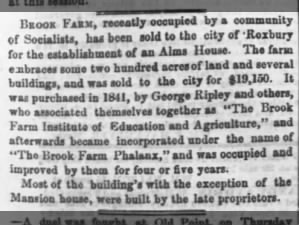 Brook Farm, once property of George Ripley and others, sold to city of Roxbury Tue, May 1, 1849 – Page 2 · The Evening Post (New York, New York) · Newspapers.com
Brook Farm, once property of George Ripley and others, sold to city of Roxbury Tue, May 1, 1849 – Page 2 · The Evening Post (New York, New York) · Newspapers.com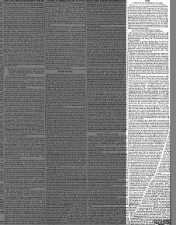 Tribute to Transcendentalism leader Margaret Fuller includes details on her life and death Sat, Aug 24, 1850 – 9 · Manchester Weekly Times and Examiner (Manchester, Greater Manchester, England) · Newspapers.com
Tribute to Transcendentalism leader Margaret Fuller includes details on her life and death Sat, Aug 24, 1850 – 9 · Manchester Weekly Times and Examiner (Manchester, Greater Manchester, England) · Newspapers.com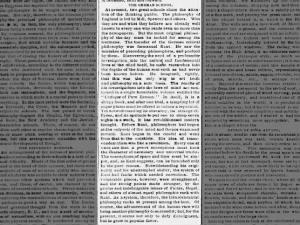 Opinion article on the beliefs and influence of Immanuel Kant as a founding philosopher Sun, Mar 5, 1876 – 2 · St. Louis Globe-Democrat (St. Louis, Missouri) · Newspapers.com
Opinion article on the beliefs and influence of Immanuel Kant as a founding philosopher Sun, Mar 5, 1876 – 2 · St. Louis Globe-Democrat (St. Louis, Missouri) · Newspapers.com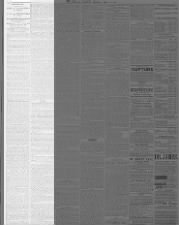 A History of Transcendentalism, its beginnings in Kant's ideas, and its New England leaders Mon, May 29, 1876 – 7 · Chicago Tribune (Chicago, Illinois) · Newspapers.com
A History of Transcendentalism, its beginnings in Kant's ideas, and its New England leaders Mon, May 29, 1876 – 7 · Chicago Tribune (Chicago, Illinois) · Newspapers.com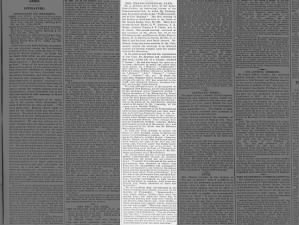 Brief history of the Transcendental Club, created by George Ripley, Ralph Waldo Emerson, and others Sat, Jan 5, 1878 – 9 · Chicago Tribune (Chicago, Illinois) · Newspapers.com
Brief history of the Transcendental Club, created by George Ripley, Ralph Waldo Emerson, and others Sat, Jan 5, 1878 – 9 · Chicago Tribune (Chicago, Illinois) · Newspapers.com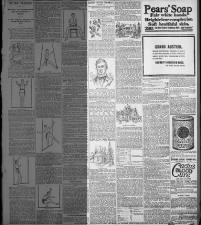 Henry David Thoreau: early life, friendship with Emerson and his circle, Walden and other works Sun, Aug 10, 1890 – Page 13 · St. Louis Post-Dispatch (St. Louis, Missouri) · Newspapers.com
Henry David Thoreau: early life, friendship with Emerson and his circle, Walden and other works Sun, Aug 10, 1890 – Page 13 · St. Louis Post-Dispatch (St. Louis, Missouri) · Newspapers.com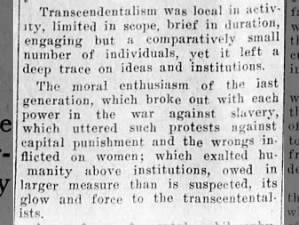 Excerpt from 1910 clipping comments on Transcendentalist influence on reform movements Sun, May 29, 1910 – Page 14 · Morning Register (Eugene, Oregon) · Newspapers.com
Excerpt from 1910 clipping comments on Transcendentalist influence on reform movements Sun, May 29, 1910 – Page 14 · Morning Register (Eugene, Oregon) · Newspapers.com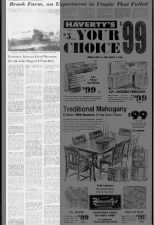 Painting and brief history of Brook Farm more than 100 years after its decline (excerpt) Sun, Jul 7, 1963 – 76 · The Tampa Tribune (Tampa, Florida) · Newspapers.com
Painting and brief history of Brook Farm more than 100 years after its decline (excerpt) Sun, Jul 7, 1963 – 76 · The Tampa Tribune (Tampa, Florida) · Newspapers.com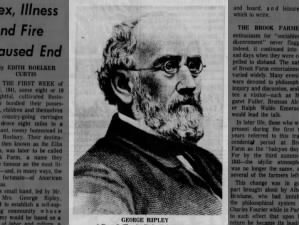 George Ripley, Unitarian minister, Transcendentalist, and founder of Brook Farm Fri, Jul 12, 1963 – 4 · The Courier (Waterloo, Iowa) · Newspapers.com
George Ripley, Unitarian minister, Transcendentalist, and founder of Brook Farm Fri, Jul 12, 1963 – 4 · The Courier (Waterloo, Iowa) · Newspapers.com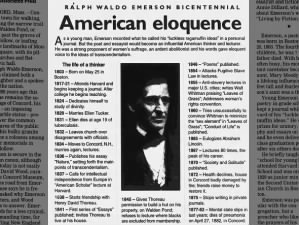 Ralph Waldo Emerson portrait and summary of life's work in Transcendentalism and beyond Sun, May 18, 2003 – 31 · Rocky Mount Telegram (Rocky Mount, North Carolina) · Newspapers.com
Ralph Waldo Emerson portrait and summary of life's work in Transcendentalism and beyond Sun, May 18, 2003 – 31 · Rocky Mount Telegram (Rocky Mount, North Carolina) · Newspapers.com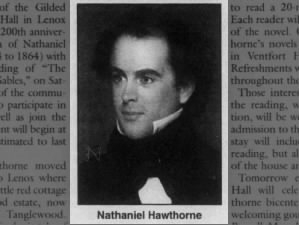 Writer Nathaniel Hawthorne, who lived briefly in Transcendentalism utopia Brook Farm Thu, Jun 10, 2004 – 22 · North Adams Transcript (North Adams, Massachusetts) · Newspapers.com
Writer Nathaniel Hawthorne, who lived briefly in Transcendentalism utopia Brook Farm Thu, Jun 10, 2004 – 22 · North Adams Transcript (North Adams, Massachusetts) · Newspapers.com